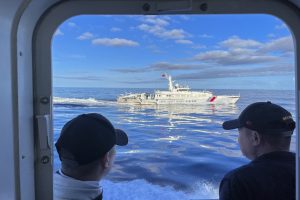More than three out of every four Filipinos consider China to be the biggest threat to their country, according to a survey released this week, as tensions continue to rise between the two nations in disputed parts of the South China Sea.
According to the survey results, released by the local pollster OCTA Research on Wednesday, 76 percent of the 1,200 respondents polled on March 11-14 said that they saw China as the “greatest threat” to the Philippines. This compared to just nine percent for Russia, which was viewed as the country’s second biggest threat, followed by minuscule proportions of respondents who chose North Korea, Pakistan, and Japan.
While the proportion of respondents viewing China as the main threat is slightly down on the previous survey conducted late last year, which saw the figure hit a three-year high of 79 percent, it marks a 17 percent increase from October 2022, the first survey conducted by OCTA Research after President Ferdinand Marcos Jr. took office. The survey also found that 91 percent of respondents said they “distrust” China, up from 58 percent at the start of the Marcos administration.
These results reflect the sharp increase in tensions in the South China Sea since the beginning of Marcos’ term in mid-2022, which has since been marked by a line of confrontations between the two nations’ coast guards in contested parts of the waterway. Among the most serious flashpoints has been Second Thomas Shoal in the Spratly Islands, where the China Coast Guard has attempted to prevent the Philippines from resupplying the BRP Sierra Madre, a grounded warship that functions as its outpost on the shoal. Most recently, the Philippines accused the China Coast Guard of seizing supplies, including food and medicine, that it had airdropped to its outpost.
There have also been a number of high-seas incidents close to Scarborough Shoal, a standalone atoll 198 kilometers west of the Philippines’ Luzon island.
The maritime stand-offs have pushed relations between Beijing and Manila to the lowest point in a decade, with the two sides now exchanging weekly diplomatic fusillades.
According to OCTA Research, these tensions have also bled into broader perceptions of China among Filipinos. Only 13 percent of survey respondents said that China had a positive impact on the Philippines, down from 16 percent in the survey conducted in December 2023. Meanwhile, 44 percent said that China did not have a positive impact on the country’s economy. This represented little change to the survey from December 2023, but was 13 points higher than the figure in October 2022, OCTA Research noted.
That the campaign of Chinese coercion in the South China Sea would undermine the country’s standing in the Philippines is no surprise – indeed, as far back as September 2022, Pew Research found that more than 80 percent of Filipinos were very or somewhat concerned about military conflict with China – but the survey indicates the extent of the reputational damage that Beijing has sustained in the country. It also suggests that the strong stance that Marcos has taken against the recent Chinese actions, and his determination not to cede “one square inch” of territory to Beijing, is likely to be very popular domestically. Indeed, the OCTA Research survey found that 61 percent of Filipinos agreed with the Marcos administration’s response to China’s growing aggressiveness in the South China Sea.
China’s unpopularity with the Filipino public is probably of little concern for Beijing, whose conception of soft power revolves around the strong gravitational pull of its economy. It is also unclear whether being hated by the country’s population will ultimately matter much in the context of Beijing’s growing maritime hard power. But there surely comes a point where this unpopularity will begin to undermine Chinese interests in the country. While trade and investment ties between the two nations have been mostly unaffected by the maritime skirmishes, there is a risk for Beijing that over the long run such low levels of public trust might lead to a gradual economic decoupling.
































